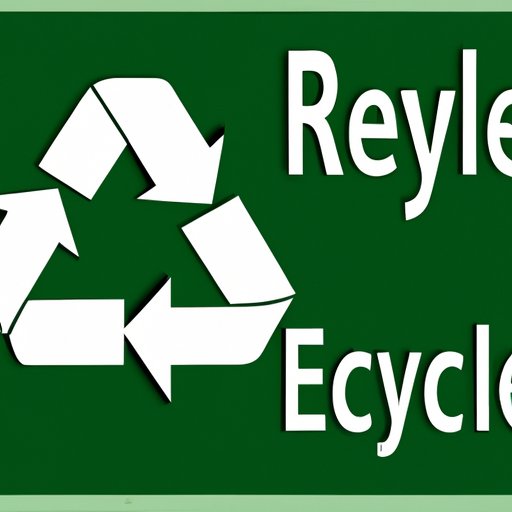Introduction
Recycling is an essential practice that helps protect our environment, conserve resources, and create a cleaner, healthier future for us all. In this article, we’ll explore why recycling matters and the many benefits it provides. We’ll also discuss practical ways to overcome common barriers to recycling and share tips for incorporating recycling into your daily routine.
Sustainable Practices: The Importance of Recycling for Our Planet
Sustainable practices are those that minimize damage to the environment, protect resources, and aim for long-term viability. Recycling is a critical component of sustainability because it helps reduce waste, conserve resources, and decrease pollution. Landfills, which are used to handle waste that isn’t recycled or reused, are a significant contributor to environmental pollution.
Landfills emit greenhouse gases such as methane, which contribute to climate change, and can also contaminate soil and groundwater. Recycling helps conserve resources, such as trees, water, and minerals, as it reduces the need for new raw materials. It also reduces energy use because recycling an item typically requires less energy than creating a new one from scratch. Recycling also decreases demand for landfill space, which can help protect communities from the negative impacts of landfill emissions.
Finally, recycling contributes to a healthier ecosystem by reducing the amount of pollution released into the air, soil, and water. Recycling helps mitigate air and water pollution by reducing the need for industrial processing of raw materials and by decreasing the amount of waste in landfills. By recycling, we can work together to create a cleaner, healthier planet for ourselves and future generations.
The Social Benefits of Recycling: A Win-Win for Communities and the Environment
Recycling provides many benefits to society beyond environmental sustainability. Recycling can create jobs and provide economic benefits by creating new markets for recycled materials. It also helps reduce pollution levels in communities and decreases the amount of waste that is transported and handled, reducing the potential for accidents or environmental hazards.
When recycling is implemented at a local level, it can have numerous social benefits. Local recycling programs can create jobs in areas like collection, sorting, and processing, creating social and economic opportunities for communities. Recycling can also help reduce pollution levels and help to improve air and water quality by reducing the amount of waste being buried or burned.
Finally, recycling makes good business sense for companies that implement it. By reducing waste, companies can control costs associated with waste disposal and avoid potentially costly fines for violating environmental regulations. Recycling may also help businesses generate new revenue streams by creating opportunities for the sale of recycled materials.
Health and Environment: How Recycling Can Benefit Both
In addition to the social and environmental benefits of recycling, there are also significant health benefits. Recycling can reduce human exposure to potentially harmful chemicals and substances that are present in waste, such as lead and mercury. By decreasing the amount of waste being sent to landfills, recycling can also minimize the amount of greenhouse gases being released into the atmosphere, reducing the potential for harm to human health.
Recycling also reduces the amount of air and water pollution, which can help prevent respiratory problems and other illnesses caused by pollution. The air and water quality improvements associated with recycling can significantly contribute to improving public health, particularly in areas of high pollution levels.
The Economic Case for Recycling: Saving Money and Resources
Recycling provides significant financial benefits at both the individual and community levels. By recycling, individuals can reduce the cost of waste disposal and can also create new revenue streams by selling recyclable materials. Communities can reduce costs associated with waste transportation and disposal and can even create new jobs in the waste management industry.
Recycling can save valuable resources that are used to create new products. By using recycled materials instead of new ones, resources such as water, energy, and minerals can be conserved. Furthermore, companies can save money by using recycled materials rather than purchasing new ones. When businesses use recycled materials, they can reduce raw material costs, transportation costs, and energy use.
Breaking Down Barriers: Overcoming Obstacles to Recycling
Despite the many benefits, there are still barriers to recycling that prevent some individuals and communities from participating. These barriers may include a lack of accessibility to recycling facilities, lack of knowledge about recycling, or misconceptions about the effectiveness of recycling programs.
To overcome these challenges, communities can work to improve accessibility to recycling programs, increasing education and awareness efforts, and making it easier for people to participate. Providing recycling facilities in high-traffic areas, distributing educational materials, and implementing convenient recycling programs can all be effective ways to increase recycling participation and overcome barriers to recycling.
The Power of Individual Action: How Your Recycling Habits Can Make a Big Impact
Every person’s contribution to recycling is essential to its success. Whether you’re recycling at home, work, or in your local community, you’re making a significant contribution to the health of our planet. Making small changes to your daily routine, like bringing your reusable shopping bags, recycling paper and plastic products, or buying products made from recycled materials, can have a significant impact on your community and the environment.
By recycling, you’re telling the world that you care about the environment and future generations. You’re making a statement that your values are important, and you’re living them out through your actions. Making a personal commitment to recycling sends a message to your family, friends, and community, that they too can make a difference by taking small steps toward sustainability.
Conclusion
Recycling benefits everyone; the environment, the economy, and society at large, and it’s up to all of us to ensure that we make it a priority in our daily lives. As we’ve seen, recycling conserves resources, strengthens communities, reduces pollution, and helps promote a healthier planet for this generation and the next. So let’s all commit to doing our part by recycling, encouraging others to recycle, and continuing to strive for a cleaner, healthier future for everyone.
